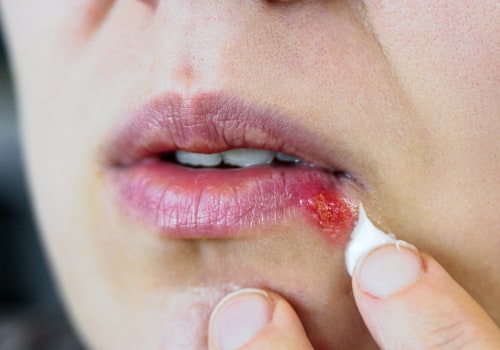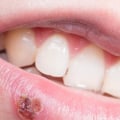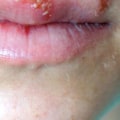When it comes to the risks of untreated oral herpes, many people don't think twice. But in rare cases, vision problems can occur as a result of this virus. While it's not common, it's important to understand the risks so that you can take appropriate precautions. In this article, we'll explore the potential vision problems associated with untreated oral herpes and what you can do to protect your vision. Vision problems caused by untreated oral herpes can be a rare but serious condition, and it is important to understand the risks and potential long-term effects.
Oral herpes, or herpes simplex virus 1 (HSV-1) is the most common type of herpes infection and it typically affects the mouth and lips. In rare cases, HSV-1 can spread to the eyes and lead to vision problems. The main cause of vision problems in people with untreated oral herpes is the direct spread of HSV-1 from the mouth to the eyes. This can happen if someone with a cold sore touches their eye, or if an individual with no visible symptoms of herpes touches their eye after coming into contact with someone else’s saliva, such as sharing food or drinks.
The symptoms of vision problems caused by oral herpes include redness, pain, blurred vision, and sensitivity to light. In severe cases, the infection can cause corneal ulcers and scarring of the cornea, which can cause permanent vision loss. Treatment for vision problems caused by untreated oral herpes includes antiviral medications and topical creams to reduce inflammation and pain. In some cases, surgery may be necessary to repair the damage to the cornea.
In order to reduce the risk of vision problems caused by untreated oral herpes, it is important to practice good hygiene and avoid sharing food or drinks with someone who has a cold sore. Additionally, it is essential to seek prompt medical treatment for any signs or symptoms of oral or genital herpes. Some people may disagree with these recommendations, arguing that treatment with antiviral medications carries its own risks. It is important to speak with a healthcare provider about the potential risks and benefits of treatment before making any decisions.
How Can I Reduce the Risk of Vision Problems from Untreated Oral Herpes?
Having untreated oral herpes can increase the risk of vision problems, but there are ways to reduce this risk.Proper hygiene and prompt treatment are the best ways to prevent vision problems. Good hygiene is important for reducing the spread of oral herpes. The virus is spread through saliva, so it's important to avoid sharing food, drinks, utensils, and other items that come into contact with saliva. Additionally, wash your hands often with soap and water and avoid touching your eyes, nose, and mouth. If you have any symptoms of oral herpes, such as cold sores or blistering, it's important to seek medical attention right away.
Prompt treatment with antiviral medications can help reduce the severity of symptoms and reduce the chances of vision problems. Your doctor may also prescribe antiviral eye drops to help prevent further damage to your eyes. In addition to proper hygiene and prompt treatment, it's also important to practice other preventive measures. Wear sunglasses when you go outside to protect your eyes from UV rays. Limit your exposure to harsh chemicals and toxins that can irritate your eyes.
And if you wear contact lenses, be sure to replace them regularly and follow proper contact lens hygiene guidelines. By following these tips, you can reduce your risk of vision problems from untreated oral herpes.
What Are the Symptoms of Vision Problems from Untreated Oral Herpes?
Vision problems caused by untreated oral herpes can have a range of symptoms. These can vary in severity and duration, but generally include redness, swelling, pain, and blurred vision. Other symptoms can include sensitivity to light, inflammation, and eye discharge. Redness is usually the most common symptom of vision problems from untreated oral herpes. This can range from mild to severe, and may be accompanied by swollen eyelids or a feeling of pressure behind the eyes.Swelling can also occur around the eyelid and may cause the eye to appear puffy or swollen. Pain is another common symptom of vision problems related to untreated oral herpes. This can range from mild discomfort to severe pain and burning sensations. Blurred vision is also a common symptom, and can be accompanied by double vision or difficulty focusing. Sensitivity to light is another possible symptom of vision problems from untreated oral herpes. This can include bright lights appearing too bright, or the inability to tolerate bright lights at all.
It can also cause photosensitivity which can lead to discomfort when exposed to even normal levels of light. Inflammation is a symptom that is often associated with vision problems caused by untreated oral herpes. This can cause redness, swelling, and tenderness in and around the eye area. In some cases, inflammation can also lead to scarring of the cornea or other tissue damage. Eye discharge is another symptom that may be related to vision problems caused by untreated oral herpes. This can include clear or yellowish fluid that is released from the eye.
It can also cause the eye to become itchy or irritated. If you experience any of these symptoms, it is important to seek medical attention as soon as possible. Untreated vision problems related to oral herpes can cause permanent vision loss if left untreated.
How Are Vision Problems from Untreated Oral Herpes Treated?
Vision problems from untreated oral herpes can be treated with medications and other treatments, depending on the severity of the condition. Common treatments for vision problems from untreated oral herpes include antiviral medications, steroid injections, or surgical intervention. These treatments can help reduce inflammation, reduce pain, and prevent further damage to the eyes. Antiviral medications are a common treatment option for people with vision problems from untreated oral herpes.These medications work by reducing the virus' ability to replicate and spread. They can also help reduce inflammation and relieve pain associated with vision problems. Examples of antiviral medications used to treat vision problems include acyclovir, valacyclovir, and famciclovir. Steroid injections are another treatment option for people with vision problems from untreated oral herpes. Steroids help reduce inflammation and decrease the amount of virus present in the body.
They can also help reduce pain and improve vision. In some cases, surgery may be recommended to correct vision problems from untreated oral herpes. Surgery is usually used to repair damage to the eye caused by the virus, such as scarring or retinal detachment. It is also used to improve vision by correcting any structural abnormalities in the eye. In addition to these treatments, there are lifestyle modifications that can help reduce the risk of vision problems from untreated oral herpes. These include avoiding activities that may cause further irritation to the eyes, such as swimming or using a hot tub. They can also help reduce pain and improve vision. In some cases, surgery may be recommended to correct vision problems from untreated oral herpes. Surgery is usually used to repair damage to the eye caused by the virus, such as scarring or retinal detachment. It is also used to improve vision by correcting any structural abnormalities in the eye. In addition to these treatments, there are lifestyle modifications that can help reduce the risk of vision problems from untreated oral herpes. These include avoiding activities that may cause further irritation to the eyes, such as swimming or using a hot tub.
It is also important to avoid touching or rubbing your eyes, as this can spread the virus. Overall, there are several treatments available for people with vision problems from untreated oral herpes. Antiviral medications, steroid injections, and surgery are all effective treatment options that can help reduce inflammation and improve vision. In addition, lifestyle modifications can help reduce the risk of further eye damage.
What Causes Vision Problems from Untreated Oral Herpes?
Vision problems caused by untreated oral herpes are usually the result of the virus spreading to the eyes. The virus is highly contagious and can be spread through contact with a person who is infected, as well as through sharing personal items such as toothbrushes, towels, and razors.Once the virus enters the eye, it can cause inflammation that can lead to vision loss or blurred vision. The virus can also cause scarring of the cornea, which can lead to reduced vision. In some cases, the virus can also cause retinal detachment, which can be very serious and even cause blindness. Additionally, the virus can cause inflammation in other parts of the eye, such as the optic nerve and retina, which can also lead to vision problems.
It is important to note that vision problems caused by untreated oral herpes may not be reversible, so it is important to seek medical attention right away if you experience any symptoms of the virus. Early treatment is key to reducing the risk of vision problems and other complications.
Treatment
Treatment for vision problems caused by untreated oral herpes usually involves antiviral medications. These medications can help reduce the symptoms of the virus and help prevent any further damage to the eyes.It is important to note that antiviral medications cannot cure the virus, but they can help reduce its symptoms and prevent further damage.
Prevention
The best way to prevent vision problems caused by untreated oral herpes is to practice good hygiene and avoid contact with people who have the virus. If you are in close contact with someone who has herpes, be sure to use gloves and wash your hands regularly. Additionally, use condoms when engaging in sexual activity to reduce the risk of transmission.It is also important to seek medical attention right away if you experience any symptoms of oral herpes, as early treatment is key to preventing any further complications. By taking proper precautions and seeking medical attention right away, you can reduce your risk of developing any serious vision problems from untreated oral herpes. In conclusion, vision problems can be a rare side effect of untreated oral herpes. It is important to understand the potential causes, the symptoms associated with it, and how to reduce the risk of developing these complications. Prompt treatment is key in reducing the risk of long-term vision problems, so it is important to seek medical advice and follow any prescribed treatment plans to help protect your vision. By being mindful of the risks associated with untreated oral herpes, you can take preventive measures to help protect your vision and reduce the chances of developing vision problems.
With the right medical care and lifestyle modifications, you can reduce your risk for vision problems due to untreated oral herpes.






